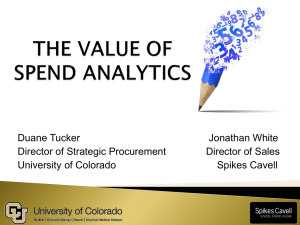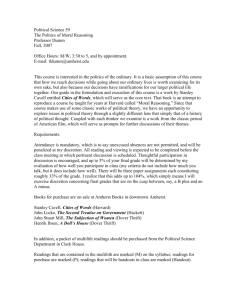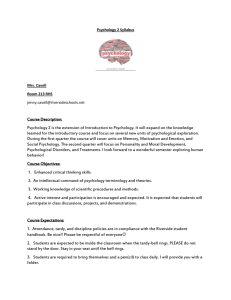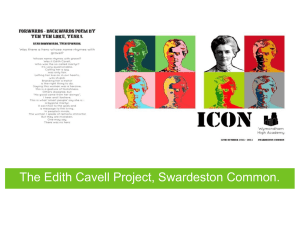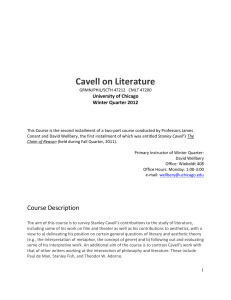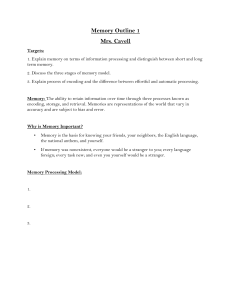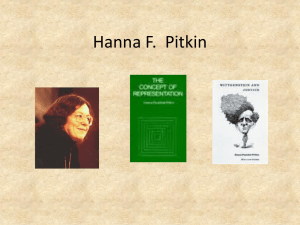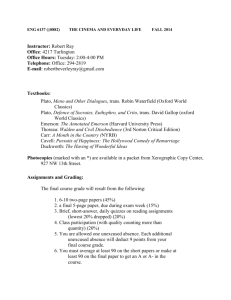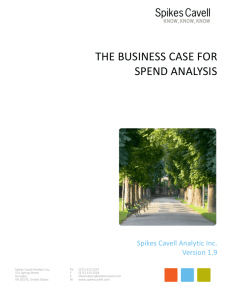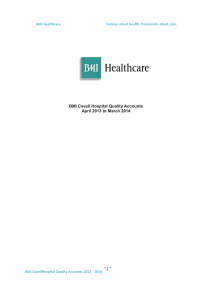PS 59 The Politics of Moral Reasoning Syllabus
advertisement
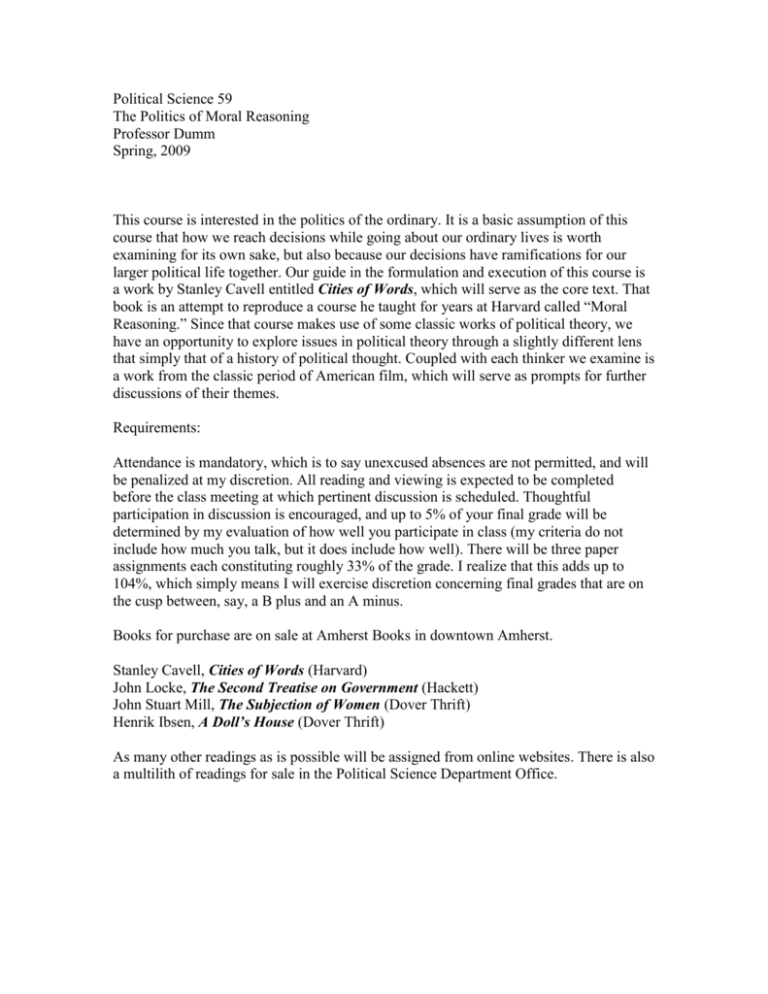
Political Science 59 The Politics of Moral Reasoning Professor Dumm Spring, 2009 This course is interested in the politics of the ordinary. It is a basic assumption of this course that how we reach decisions while going about our ordinary lives is worth examining for its own sake, but also because our decisions have ramifications for our larger political life together. Our guide in the formulation and execution of this course is a work by Stanley Cavell entitled Cities of Words, which will serve as the core text. That book is an attempt to reproduce a course he taught for years at Harvard called “Moral Reasoning.” Since that course makes use of some classic works of political theory, we have an opportunity to explore issues in political theory through a slightly different lens that simply that of a history of political thought. Coupled with each thinker we examine is a work from the classic period of American film, which will serve as prompts for further discussions of their themes. Requirements: Attendance is mandatory, which is to say unexcused absences are not permitted, and will be penalized at my discretion. All reading and viewing is expected to be completed before the class meeting at which pertinent discussion is scheduled. Thoughtful participation in discussion is encouraged, and up to 5% of your final grade will be determined by my evaluation of how well you participate in class (my criteria do not include how much you talk, but it does include how well). There will be three paper assignments each constituting roughly 33% of the grade. I realize that this adds up to 104%, which simply means I will exercise discretion concerning final grades that are on the cusp between, say, a B plus and an A minus. Books for purchase are on sale at Amherst Books in downtown Amherst. Stanley Cavell, Cities of Words (Harvard) John Locke, The Second Treatise on Government (Hackett) John Stuart Mill, The Subjection of Women (Dover Thrift) Henrik Ibsen, A Doll’s House (Dover Thrift) As many other readings as is possible will be assigned from online websites. There is also a multilith of readings for sale in the Political Science Department Office. 2 Course films will be screened on Wednesdays at 4:30 and 7:30. All of these films are also available on DVD on reserve in the Amherst College Library. They will also be streamed on the Amherst Library website. Those students not enrolled at Amherst College will be given access to these films via password. The following are our films in the order in which they will be screened, along with the name of the pertinent thinker under examination. The Philadelphia Story (1940, George Cukor) Adam’s Rib (1949, George Cukor) Gaslight (1944, George Cukor) It Happened One Night (1933, Frank Capra) Mr. Deeds Goes to Town (1936, Frank Capra) Now, Voyager (1942, Irving Rapper) Stella Dallas (1937, King Vidor) The Lady Eve (1941, Preston Sturges) His Girl Friday (1940, Howard Hawks) The Awful Truth (1937, Leo McCarey) The Man Who Shot Liberty Valance (1962, John Ford) Unforgiven (Clint Eastwood, 1992) Toy Story (John Lassiter, 1995) Emerson Locke Mill Kant Rawls Nietzsche Ibsen Freud Plato Aristotle Thoreau Nietzsche (again) I will be traveling early this semester. The calendar reflects that absence, February 5th, which will be made up on Sunday, February 8th.. Course Calendar 1. 1/27 (T) Introduction No Reading 2. 1/29 (TH) Moral Perfectionism Reading: Cavell, Introduction, Cities of Words (Henceforth, CW) 3. 2/3 (T) Emerson Reading: Emerson, “Self-Reliance,” www.emersoncentral.com/selfreliance.htm Cavell, CW, 1. Emerson 4. 2/8 (SUNDAY, 7 p.m.) The Philadelphia Story Reading: Cavell, CW, 2. The Philadelphia Story 5. 2/10 (T) Locke Reading: Locke, Second Treatise on Government, Preface and Chapters 1 through 7, (P) Cavell CW, 3. Locke. 3 6. 2/12 (TH) Adam’s Rib Reading: Cavell, CW, 4. Adam’s Rib 7. 2/17 (T) John Stuart Mill Reading: Mill, The Subjection of Women, Chapters 1, 2 and 3 (P) Cavell, CW, 5. John Stuart Mill 8. 2/19 (TH) Gaslight Reading: Cavell, CW, 6. Gaslight 9. 2/24 (T) Kant Reading: Kant, Groundwork on the Metaphysics of Morals, pp.19-32, www.earlymoderntexts.com/pdf/kantgw.pdf Cavell, CW, 7. Kant 10. 2/26 (TH) It Happened One Night Reading: Cavell, 8. It Happened One Night 11. 3/3 (T) Rawls Reading: Rawls, excerpts from A Theory of Justice (to be announced), Cavell, CW, 9, Rawls 12. 3/5 (TH) Mr. Deeds Goes to Town Reading: Cavell, CW, 10. Mr. Deeds Goes to Town 13. 3/10 (T) Nietzsche Reading; Nietzsche, “Schopenhauer As Educator,” from Unmodern Observations (M) Cavell, CW, 11. Nietzsche 14. 3/12 (TH) Now, Voyager Reading: Cavell, CW, 12. Now, Voyager SPRING BREAK 15. 3/24 (T) Ibsen Reading: Henrik Ibsen, A Doll’s House (P) Cavell, CW, 13. Ibsen 16. 3/36 (TH) Stella Dallas Reading: Cavell, CW, 14. Stella Dallas 17. 3/31 (T) Freud Reading; Freud. “On Psychotherapy” (M) Cavell, 15. Freud 18. 4/2 (TH) The Lady Eve Reading: Cavell, CW, 16. The Lady Eve 4 19. 4/7 (T) Plato Reading: Plato, Republic, Books VII and X, classics.mit.edu/Plato/republic.html Cavell, CW, 17. Plato 20. 4/9 (TH) His Girl Friday Reading: Cavell, CW, 18. His Girl Friday 21. 4/14 (T) Aristotle Reading: Nicomachean Ethics, Books I, VIII, IX, and X, classics.mit.edu/Aristotle/nicomachaen.html Cavell, CW, Artistotle 22.4/16 (TH) The Awful Truth Reading: Cavell, CW, 20. The Awful Truth 23. 4/21 (T) Thoreau Reading: Civil Disobedience, thoreau.eserver.org/civil.html 24.4/23 (TH) The Man Who Shot Liberty Valance 25. 4/28 (T) Nietzsche (Again) Reading: “The Pale Criminal,” nietzsche.thefreelibrary.com/Thus-Spake-Zarathustra/8-1 26. 4/30 (Th) Unforgiven Reading: Dumm, Undoing Death in “Unforgiven” (Handout) 27. 5/5 (T) Toy Story (special film viewing) (or, a visit by Stanley Cavell) Reading: Dumm, Toy Stories, (Handout) 28. 5/7 Conclusion
